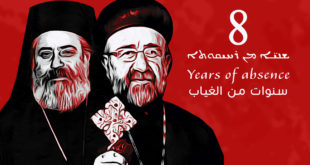Hassake, Syria (AINA) — The murder of two Assyrians in Syria last Fall (AINA 10-31-2004) by a Syrian National Guard officer and the subsequent Syrian government inaction have highlighted a profound vulnerability of and discrimination towards the indigenous Christian community there.
On the evening of October 16, 2004, Mr. Ibrahim Nasin Abdul-Ahad, an Assyrian (also known as Chaldeans and Syriacs) coffee shop owner left his shop in Hassake to visit his father-in-law in this historically Assyrian city in northeastern Syria. As he neared his father-in-law’s home, Mr. Abdul-Ahad encountered his father-in-law’s immediate neighbor, Mr. Raad Al Raadi, a Syrian from nearby Der-A-Zoor.
On this particular evening, Mr. Al Raadi, accompanied by two of his brothers including Murad, a Lieutenant in the Syrian National Guard, confronted and threatened Mr. Abdul-Ahad. Fearing for his safety, Mr. Abdul-Ahad fled into his father-in-law’s home. The Al Raadi brothers grew more agitated and violent. They approached the home and began to try to break in.
Outnumbered, Mr. Abdul-Ahad telephoned his own brother to come to his assistance. As Mr. Abdul-Ahad’s brother appeared, the three Al Raadi brothers attacked him. Hearing the commotion outside, Ibrahim Abdul-Ahad ventured out to aid his fallen brother only to be immediately shot twice by Mr. Al Raadi. As Mr. Abdul-Ahad fell, Al Raadi’s brother Murad, the Syrian National Guard officer, drew his own Syrian National Guard issued handgun, walked over to the nearly lifeless body of Ibrahim Abdul-Ahad, placed the gun under his chin and coldly fired a single bullet, execution style, through Mr. Abdul-Ahad’s brain.
As Abdul-Ahad lay in a pool of blood, a now enraged Murad Al Raadi began shrieking and screaming while kicking the lifeless head and body of Mr. Abdul-Ahad, swearing obscenities to all “Christian dogs who deserve this fate.”
As a small crowd of terrified neighbors looked on and attempted to draw closer, Murad Al Raadi threatened that he would kill any “Christian dogs” that tried to help the “worthless infidel.” In utter disbelief, Mr. Yelda Yacoub Youkhana, Mr. Abdul-Ahad’s neighbor, ignored the threats in order to see if there remained a chance to save Mr. Abdul-Ahad. As Mr. Youkhana bent down to comfort his neighbor, Murad Al Raadi shot Mr. Youkhana in the back. The gathering crowd managed to extricate Mr. Youkhana’s body and wisked him away to the hospital. Mr. Abdul-Ahad was already dead at the scene of the murder.
For days, the Abdul-Ahad family’s pleas for help from the State and police went unheeded as the Al Raadi brothers remained free. No investigation was launched and no arrests made. Assyrian Christian rage began to build and a committee of civic and religious leaders was established to address the government’s abdication of its responsibility and to press for the upholding of law against the Al Raadi brothers.
The committee included the Syriac Orthodox Bishop of Hassake, Mr. Bashir Saadi, the head of the Assyrian Democratic Organization (ADO), Mr. Zia Malik Ismail, a former Assyrian Member of Parliament, as well as others. The committee pressed the case for justice to the authorities as well as the Al Raadi tribal elders in an attempt to lodge murder charges from the government, as well as demand the forced exile of the murderer’s family from Hassake, as is standard tribal justice.
The Arab tribal elders saw no movement against the Al Raadi brothers from the government. Days passed and the brothers remained free. At times, they were seen lounging and smoking on their front porch, just steps away from the site of the cold-blooded shootings. The brothers taunted passers by and boasted about their deep tribal and government connections. As Assyrian anger became palpable, the Syrian National Guard provided round the clock security to protect the murderers against possible vigilante attacks under the pretense that a national guard officer is a symbol of the state and, as such, needs to be protected.
Repeated efforts by the Assyrian committee of elders drew limited response. Eventually, the Arab tribal elders of the Al Raadis sensed that the government was not inclined to press for justice. The Arab tribal elders then began to pressure the Assyrian Christians into giving up their attempts to have the murderers imprisoned. The Arab Muslim leaders began to threaten an Islamic backlash if any action was taken against the murderers.
On October 30 at noon, Mr. Yelda Youkhana, who had been transferred to a hospital in Damascus, died. As news spread to Hassake, the murderers sensed the growing wave of anger and finally fled their homes with their security entourage. Hundreds of Assyrian Christians from Hassake and the Khabur River villages gathered, angered at two weeks of inaction by the government. In a spontaneous fit of rage, the Assyrians burned down the Al Raadi house and three store fronts.
At one point, the ranks of the protestors swelled to nearly 1,500 as they marched to the Governor’s palace. Once there, four representatives addressed the Governor, but still no promise was made to provide justice to the murdered Assyrians.
In the ensuing days, Assyrian Christian activists were subjected to increased pressure and threats from the Arab tribes as well as the Syrian government. The Arab tribes sent emissaries suggesting that Muslim sensibilities had been upset because a copy of the Koran was burnt in the Al Raadi house fire. An Assyrian activist responded with the obvious, that “no one purposely targeted a Koran hidden in a home and that the accusation was being fabricated in order to fuel a more general Muslim backlash against the already victimized Assyrian Christian community.”
Concurrently, Syrian government agents spread the word that the spontaneous uprising was supposedly incited and politically motivated by the ADO. Although Syrian intelligence knew the anger was a direct result of weeks of inaction and taunting by the murderers, the government hoped to capitalize on the burnings by creating a political pretext in order to raise fear of a general political crackdown on the ADO and the community.
Eventually, up to 50 Assyrians (AINA, 11-03-2004) were rounded up beginning on November 1. Most were released early on, but 24 were held in custody until recently when only 16 remained (AINA, 11-22-2004). All were beaten as standard Syrian operating procedure. All were forced to sign confessions. Initially, they were denied legal representation. When an effort was made to hire attorneys, the families were admonished that a real legal defense against the State would likely invite further reprisals. Family visits were rarely if ever allowed. Formal charges were not filed and a court date was never assigned.
Eventually, on April 27, 2005, after six months of detention and beatings, the remaining 16 were released (AINA, 04-28-2005) due to Syrian government insiders fearing an internationalization of the crisis. As one Assyrian analyst noted, “Different factions vied with each other over the future fate of the remaining 16, with security forces demanding to make an example of a restive minority and Syrian diplomats seeking to defuse another international embarrassment.”
The 16 still face civil court and, according to Syrian law, can still be called back into court for criminal charges. Moreover, the family of the murderers have stepped up threats and intimidation against the victims’ families in an attempt to coerce the victims into not pressing for the murderers’ trial and punishment. In the meantime, the murderers, including the Syrian National Guard officer, have been whisked away to an undisclosed location, ostensibly in prison awaiting trial. No trial date has been set. It is widely believed that the government is buying time in the hope that anger will wane and a more threatened Assyrian community will acquiesce with the release of the murderers.
For Assyrian Christians, the crisis demonstrates an all too typical vulnerability and generalized limited access to justice of the Christian community in Syria in particular and the region as a whole. Despite having two Assyrians murdered in front of their homes before many witnesses, the community finds itself further threatened politically by the State and religiously by neighboring communities simply for objecting to its status as a perennial victim. The situation reflects a common predicament of Middle Eastern minorities in general, but more specifically of Christians regionally from the Sudan to Iran.
Despite the brutal murders and State attempts at intimidation, many Assyrian observers remained defiant and steadfast. The outrage and general uprising was praised by many as a sign that blatant injustice and discrimination could only go so far before even the persecuted Christian community began to violently resist. To many, those imprisoned had stood up to tyranny and injustice. Their release signified the vindication of their actions.
Copyright (C) 2005, Assyrian International News Agency. All Rights Reserved.
 Assyrian Democratic Organization ADO
Assyrian Democratic Organization ADO





